Table of Content
In today’s digital world, online visibility is essential for business success. On-page SEO optimization service is key in achieving this goal. With countless websites vying for attention, making yours stand out can be challenging. This is where on-page optimization becomes crucial—a significant advantage for small business owners, digital marketers, and SEO beginners. By optimizing keyword placement, meta tags, internal linking, and content quality, these services make your website appealing to both users and search engines.
This guide provides a comprehensive on-page SEO checklist aimed at boosting website performance, improving load times, enhancing user experience, and increasing search engine rankings. As we explore on-page SEO strategies utilized by Rankonix, you’ll discover techniques backed by an expert SEO team committed to helping your business succeed online. Rankonix is your reliable partner in SEO, web development, digital marketing, and other essential services, ensuring a strong and effective online presence. Dive into these strategies to maximize your website’s potential.
Mastering On-Page SEO Optimization Service for Digital Success
Gone are the days when simply having a website was enough. Today, mastering on-page SEO is essential. It’s not just about owning a website; it’s about ensuring it attracts the right audience. On-page SEO services optimize every element of your site to appeal to search engines and users alike. Consulting with an on page SEO expert can make a significant difference in your digital strategy.
Understanding on-page SEO means speaking the language of the digital world. It empowers businesses to communicate effectively with search engines, a vital factor for online visibility. Engaging an on page SEO expert ensures that you are leveraging the best practices for optimization.
With effective on page SEO optimization services, guided by an on page SEO expert, you can reap numerous benefits—from attracting more organic traffic to enhancing user engagement. Let’s explore why on-page SEO is indispensable for any business aiming for online success.
What Is On-Page SEO?
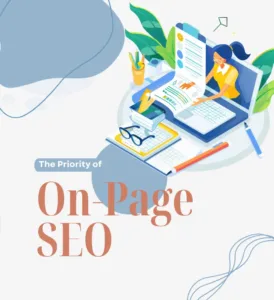
On-page SEO involves optimizing individual web pages to rank higher and attract more relevant traffic from search engines. It’s about ensuring each page speaks the internet’s language, communicating effectively with both search engines and visitors.
At its core, on-page SEO focuses on content optimization, ensuring your content is relevant, high-quality, and rich in keywords. On-site SEO extends beyond content; HTML tags play a crucial role in helping search engines understand your material.
Consider on-page SEO as setting the stage for your website’s success. Just as a well-designed stage enhances a performance, effective on-page SEO boosts your website’s performance, ensuring it impresses search engines and visitors alike.
The Importance of On-Page SEO Optimization Service
On-page SEO is crucial for improving your website’s visibility. A well-optimized page can elevate search rankings, making it easier for your target audience to discover your site. This increased visibility translates into more traffic, leads, and ultimately, sales.
Beyond search rankings, on-page SEO services enhance the user experience. By ensuring that your website is easy to read and navigate, visitors are more likely to stay longer, increasing engagement and conversion rates while fostering a loyal customer base.
Effective on-page SEO also helps reduce bounce rates. When users quickly and easily find what they need, they’re less likely to leave your site, enhancing performance metrics and strengthening your credibility with search engines.
Essential On-Page Optimization Services Checklist
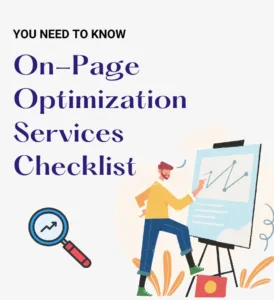
1. Optimizing Title Tags for SEO
Title tags play a critical role in on page optimization services and user engagement, acting as the first impression of your webpage in search results. To optimize title tags, keep them concise, relevant, and unique for each page. Aim for a length of 50-60 characters to ensure full display and maximize their impact. Include keywords naturally without overstuffing; create titles that appeal to both search engines and users.
2. Crafting Effective Meta Descriptions
Meta descriptions provide a quick overview of your page content and greatly influence click-through rates. An effective meta description should be concise, keyword-rich, and user-engaging. Aim for 150-160 characters for full visibility in search results, offering a clear understanding of your page’s content. Use calls to action like “Learn more” or “Discover now” to entice clicks.
3. Structuring Headings (H1, H2, H3…)
Headings help organize content, making it easier for users to read and understand while aiding search engines in determining relevance. To optimize headings, ensure clarity, structure, and enhancement of user experience. Your H1 should convey the main topic, while H2 and H3 headings should divide content into readable sections, improving engagement. Avoid jargon and ensure each heading accurately represents the content that follows.
4. Designing SEO-Friendly URL Structures
Well-structured URLs are vital for SEO, providing a descriptive, keyword-rich, and user-friendly web presence. They offer users and search engines a clear insight into your page’s content. Keep URLs simple and relevant. Descriptive URLs improve user experience by providing a quick content overview, captivating users to click. Embed relevant keywords naturally, like those from an on-page SEO service, and avoid overuse for maximum SEO benefit.
5. Keyword Usage
Keywords are crucial for on-page SEO, helping search engines understand your content and match it with user searches. To optimize keyword usage, seamlessly integrate them without overusing them. Start with thorough keyword research, identifying terms relevant to your content with high search volume. Once identified, naturally incorporate these keywords into your content, ensuring they fit smoothly within sentences and paragraphs to enhance readability. For effective on-page SEO optimization service, focus on strategic keyword placement and content flow.
6. Internal Linking
Internal linking connects different pages on your website, improving site navigation, user engagement, and distributing link equity for a better SEO strategy. By linking to related content, you encourage users to explore more, increasing time on site and lowering bounce rates. From an SEO perspective, internal links help search engines understand your site’s structure and hierarchy, improving crawlability and indexing. Utilizing on page optimization services can further enhance these benefits by ensuring your internal linking strategy aligns with best practices.
7. External Linking
External links guide users from your site to high-authority websites, building trust, enhancing credibility, and strengthening your SEO strategy. For an on-page SEO expert, linking to reputable sites enriches content by providing additional resources, boosting user experience. From an SEO viewpoint, external links indicate to search engines that your content is well-researched and reliable, increasing your page’s authority and ranking. For effective on-page SEO optimization service, external links enhance your outreach to your other social media platforms.
8. Image Optimization
Images add visual appeal to your content, but without proper optimization, they can slow down load times and affect SEO. Optimize images by refining file names, using alt tags, and ensuring both SEO and accessibility with on page optimization services. Use descriptive file names to help search engines understand image content, enhancing relevance. Alt tags describe images to search engines and visually impaired users, providing concise yet descriptive context.
9. Mobile Responsiveness
In today’s mobile-first world, a mobile-responsive site is crucial for effective on page SEO services. A responsive design adapts to various screen sizes, enhancing user experience and improving SEO rankings. It provides a consistent, user-friendly interface across devices, encouraging users to engage with your site. Google prioritizes mobile-responsive sites in SEO rankings, boosting visibility and search performance.
10. Page Load Speed
Page load speed is crucial for user engagement and SEO rankings. Fast-loading pages enhance user experience, decrease bounce rates, and promote longer visits. To improve load speed, compress images and streamline code. Use tools like Google PageSpeed Insights for actionable recommendations. Boosting load speed not only enhances user satisfaction but also improves your site’s ranking potential, as search engines prefer quick-loading sites, making on-page SEO optimization service essential for speed optimization.
Additional SEO Ranking Factors

11. Content Quality
Creating high-quality content is crucial for effective on-site SEO. This content must be original, engaging, and authoritative, providing significant value to both users and search engines. When crafting content, focus on depth and relevance to thoroughly and effectively address user queries. Moreover, capture your audience’s interest with content that truly resonates, using compelling storytelling, data-driven insights, or multimedia elements. Such content not only grabs attention but also encourages sharing and interaction, thereby expanding its reach and impact across various platforms. By emphasizing these aspects, you can develop a strong content strategy that aligns with your SEO objectives.
12. User Engagement
User engagement is a vital metric that shows how well your content connects with your audience, crucial for effective on-site SEO services. Engaging content captures attention and invites questions, comments, and interactions. Boost engagement by adding interactive elements like polls, quizzes, and infographics to encourage participation and build community. Comments and feedback provide insights into audience preferences, helping refine strategies and enhance content quality over time.
13. Readability
Making your content easy to read and understand is essential for any on-page SEO strategy. Use clear, concise sentences, bullet points, and visuals to make the text more digestible. Writing clearly, avoiding jargon, and using concise sentences make content accessible to a broader audience. Bullet points and visuals break up large text blocks, improving flow and readability, significantly boosting user engagement.
14. Social Sharing
Social sharing is key for boosting content reach and lifespan, making it essential for on-page SEO services. Encourage users to share your content to increase visibility and engagement. Place social sharing buttons prominently for easy sharing across platforms. Engage with users on social media by responding to comments, participating in discussions, and encouraging feedback to foster community and engagement, a strategy any on-page SEO expert would recommend for building a strong online presence.
15. Schema Markup
Schema markup is a specialized coding language that helps search engines understand your webpage content better, providing additional context and boosting SEO benefits. Implementing schema markup can improve your page’s search result appearance, making it a crucial part of on-site SEO services. Rich snippets, enabled by schema markup, provide extra information that can increase click-through rates by making your search result more appealing. By improving visibility and relevance, schema markup is key in effective on-page SEO optimization, bridging the gap between technical SEO and user experience.
16. Secure Your Website with SSL Certification
SSL certification is crucial for website security, user data protection, and building trust. It’s a key factor in an effective SEO strategy since search engines prioritize secure sites. A secure website enhances user trust, increases visit duration, and boosts engagement. By prioritizing user data protection and privacy, you strengthen your online presence, a goal of on-page optimization services.
From an SEO perspective, Google favors secure sites in search rankings. Implementing SSL certification can improve your site’s visibility and search engine performance, making it an essential part of on-page SEO services.
Continuous On-Page SEO Optimization Service
17. Monitor Website Performance with Google Analytics
Tracking website performance is essential for successful SEO and effective on-page SEO optimization service. Google Analytics provides valuable insights into user behavior, traffic sources, and engagement metrics. Use this data to identify areas for improvement and refine your on-page SEO strategy. Understanding user behavior helps tailor content and marketing efforts to audience needs. Regular performance monitoring keeps your site competitive, adapting to user preferences and search engine algorithm changes, making it a crucial part of on-page SEO services offered by any reputable on-page SEO agency.
18. Keep Content Fresh and Relevant
Content freshness is vital for user engagement and effective SEO, including on-page SEO service. Regularly updating content maintains its relevance and value. Fresh content attracts search engines, boosting visibility and ranking potential through on-page optimization services. It shows that your site, supported by on page SEO experts from a leading on page SEO agency, is active and up-to-date. To keep content fresh, integrate new insights, data, and trends. Regularly review and update existing content to ensure continued relevance and impact.
19. Gather User Feedback for Growth
User feedback offers insights into content effectiveness and appeal, revealing areas for improvement and growth. Encourage audience dialogue through surveys, comments, or direct interactions. This provides a deeper understanding of user preferences and expectations. Use this feedback to refine content and on-site SEO services strategies. Aligning with user needs enhances engagement, satisfaction, and overall performance, underscoring the importance of on-page SEO optimization service provided by your trusted on page SEO company.
Conclusion
Optimizing on-page SEO is essential for improving website visibility, engagement, and performance. By following a comprehensive checklist, you can ensure effective digital communication that attracts search engines and users alike. To maintain competitiveness, focus on high-quality content, user engagement, and performance monitoring. These elements keep your site relevant, valuable, and impactful in the ever-evolving digital landscape. Ready to elevate your website? Boost it with Rankonix’s on-page SEO services and transform your digital presence. Our on-page SEO expert team is ready to guide you to success. Visit our website https://rankonix.com/ or you can contact us at info@rankonix.com to learn more about our on page SEO company expertise.
FAQs
Q. What are On-Page SEO Services?
On-page SEO services focus on optimizing individual web pages to boost search engine rankings and attract targeted traffic. This includes improving content quality, strategic keyword placement, internal linking, image optimization, and technical enhancements such as increasing page load speed and ensuring mobile-friendliness. Hiring an on-page SEO agency can provide expert guidance in implementing these strategies effectively.
Q. Why is SSL Certification Important for SEO?
SSL certification is crucial because it secures user data by encrypting interactions between the user and the website. Google and other search engines favor secure sites in their rankings, making SSL certification a key part of a strong on-page SEO strategy that builds user trust and engagement.
Q. Benefits of Schema Markup for SEO ?
Schema markup helps search engines understand your content better, providing extra context that can improve how your site appears in search results. Using schema markup can result in rich snippets, which display additional information and enhance click-through rates, thereby improving visibility and performance through effective on page SEO service.
Q. How Often to Update Website Content for SEO ?
Regular content updates are essential to maintain relevance and appeal to both users and search engines. The update frequency depends on your industry, but generally, refreshing your content every few months keeps it current and aligned with trends, enhancing SEO performance. Working with an on-page SEO company can ensure your updates are optimized for the best results.
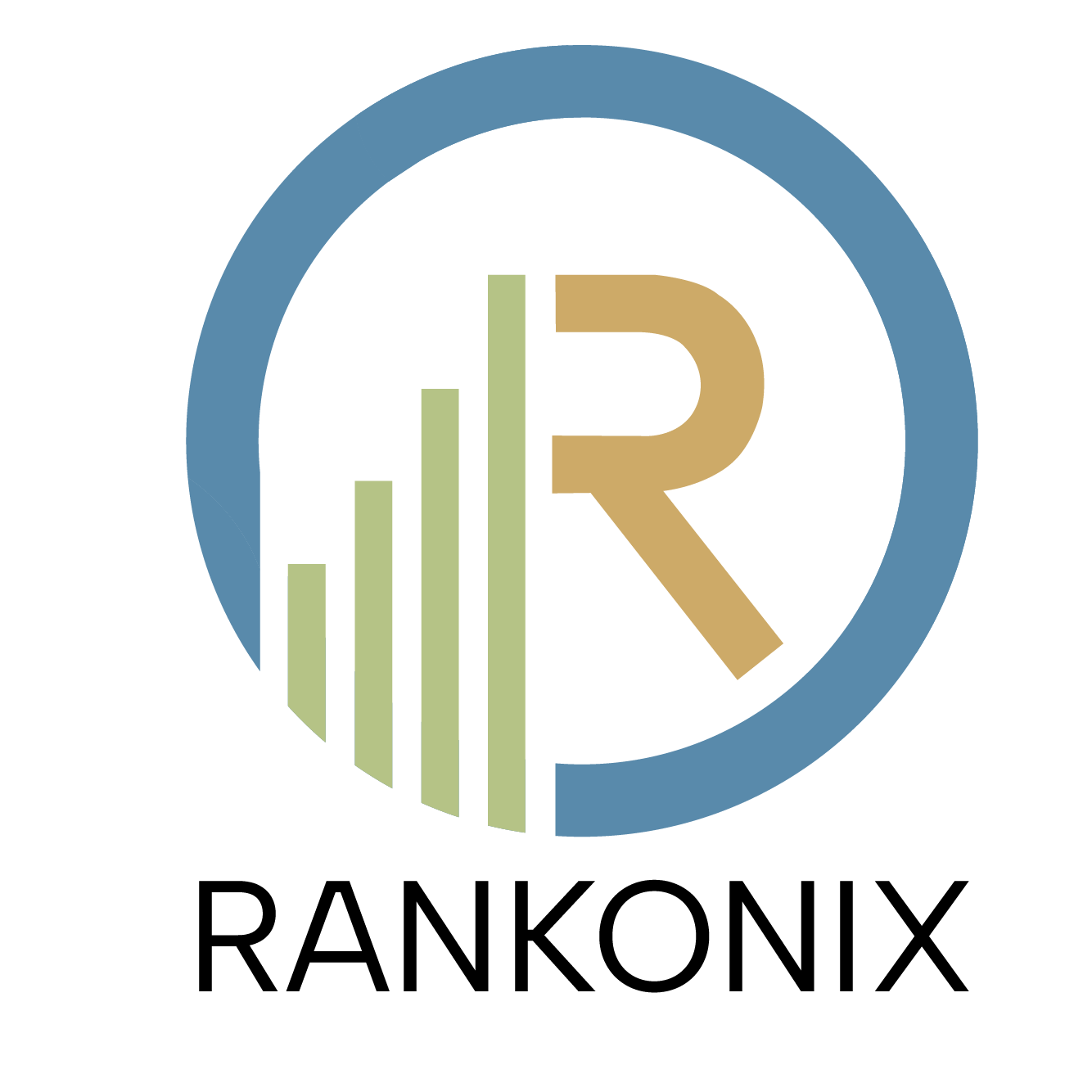
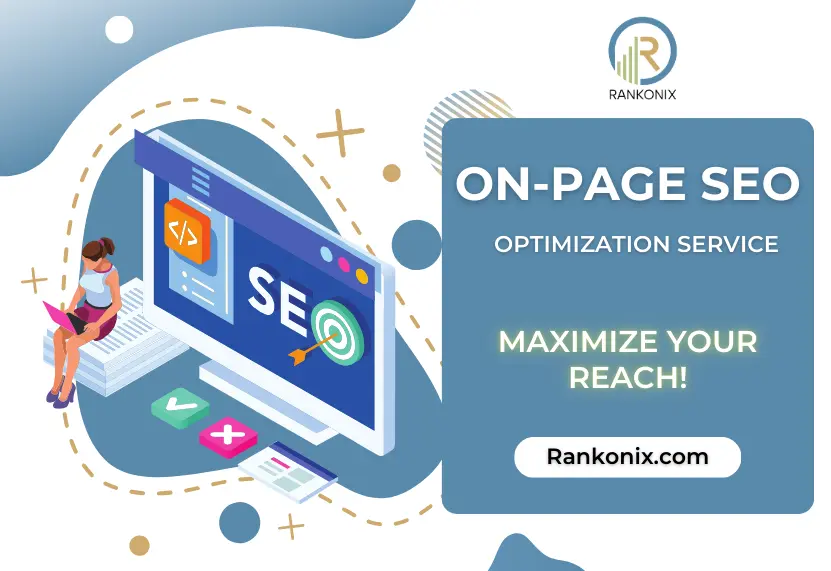
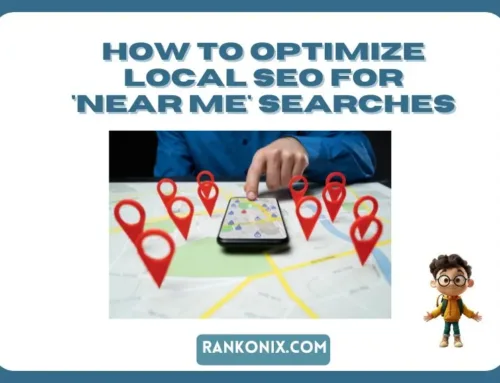
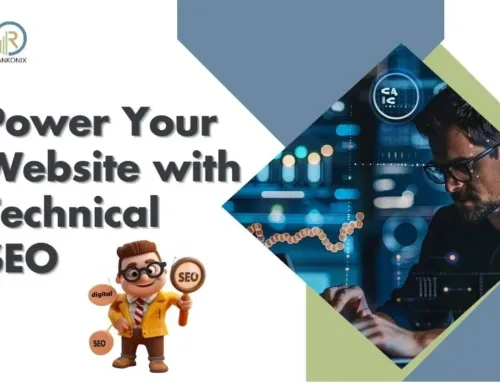
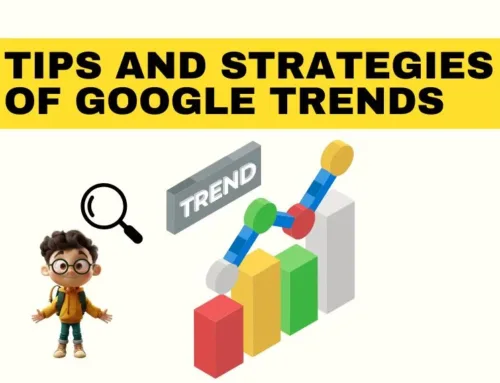
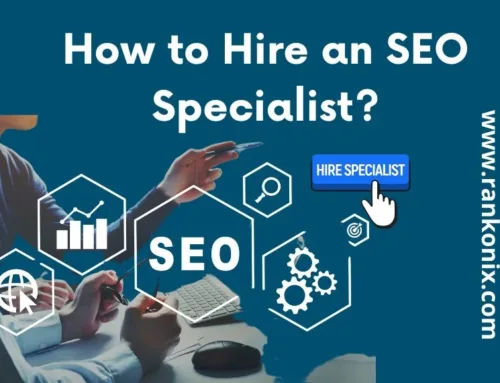
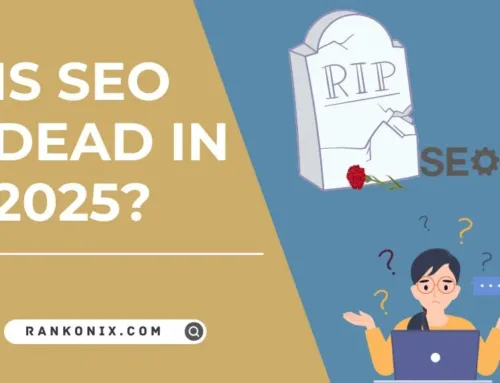
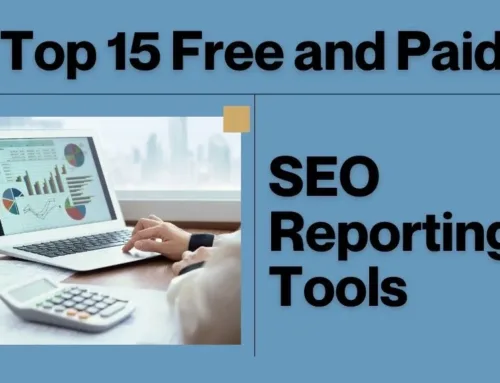
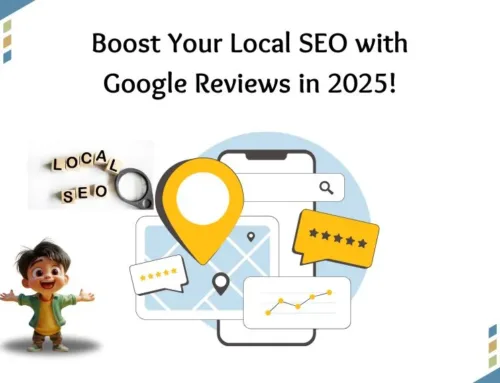
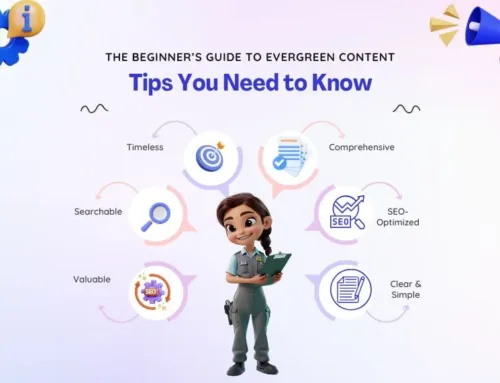
[…] and interest in what your brand offers. High conversion rates, along with SEO success metrics like organic traffic growth, keyword rankings, and click-through rates, are strong indicators of your website’s […]
[…] 2014, Google has used HTTPS as a ranking factor. Secure websites get a ranking boost because they align with Google’s focus on providing a […]
[…] content that ranks well and keeps your audience interested. In this guide, discover 12 effective SEO content optimization strategies to boost your search rankings and improve user […]